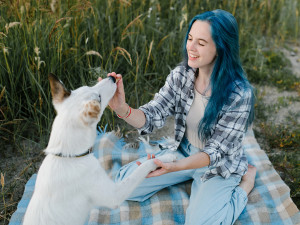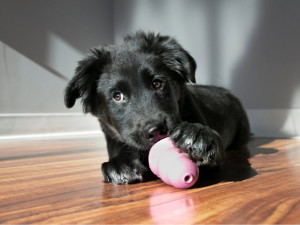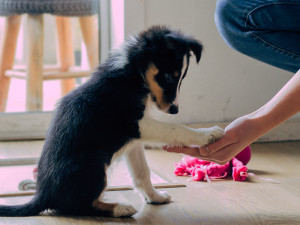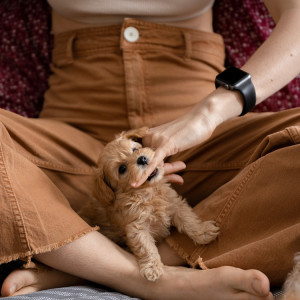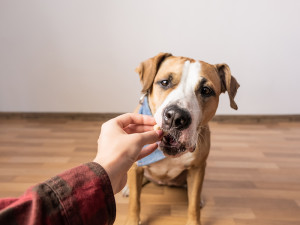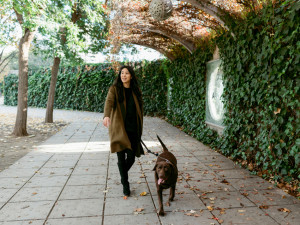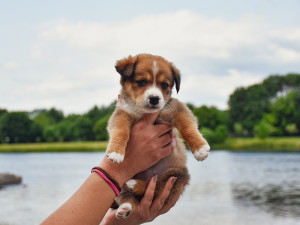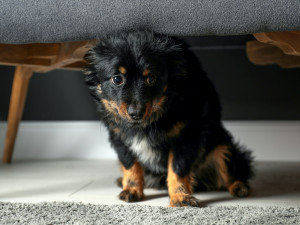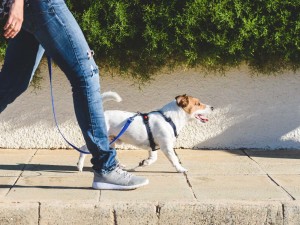How to Stop Puppy Biting: Training Your Puppy
Because bite marks are not a good look
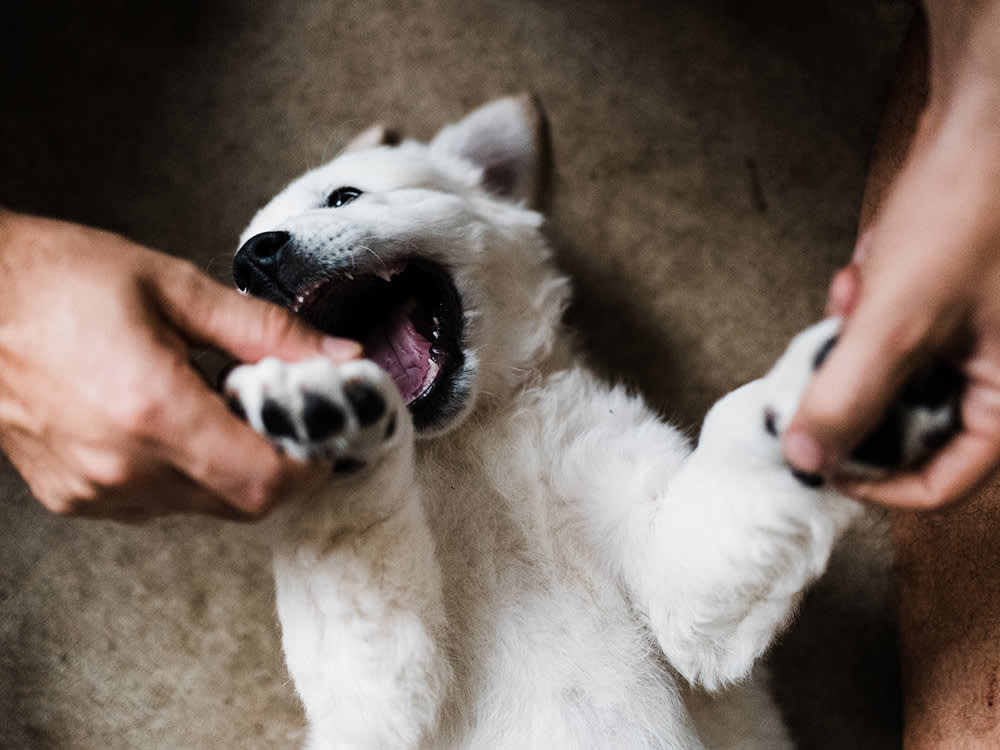
Share Article
Pretty much everything a puppy does is adorable, from the way they run and roll around during playtime to their first barks and howls. Even their little nips can be cute – except when they bite too hard with those razor-like puppy teeth. At least you know your pup will grow out of their biting phase. Right?
While it’s completely natural for your puppy to explore the world mouth-first, it’s also understandable that you may not enjoy having your hands, clothes and every other part of you chewed on. Fortunately, there are steps you can take to help stop puppy biting and teach your new dog how to engage with the world a little more gently. Kinship asked Nicole Ellis, certified animal trainer, pet lifestyle expert and Expert Collective member, to offer a few tips on how to stop a puppy from biting.
Why does my puppy bite?
Unfortunately for pet parents and other animals in the home, biting is a normal part of your puppy’s development, particularly their teething. Puppies use their teeth not just during playtime and mealtime, but to learn about the world around them, a lot of which likely feels very new.
Even human babies tend to put things in their mouth on first encounters, and puppies are no different. They learn about the taste and hardness of an object by investigating with their teeth. And when it comes to playtime, puppies often nip at each other as part of their socialisation and to encourage play – which can sometimes include nipping at your ankles when you walk by.
“Puppies could be biting as their way of playing, communicating fear or frustration, or it may feel good, such as when they are teething,” says Ellis.
What are the causes of puppy biting?
There are several common reasons why your puppy may bite you, the furniture and basically everything within reach.
Teething: just like human babies, puppies chew on everything when teething to help their brand-new teeth work through their gums. Adult dog teeth start to grow in when your pup is around 12-16 weeks old, so expect plenty of biting and chewing during this time.
Play: both puppies and adult dogs use play-biting to entice other dogs to play, but it’s important that your pup learns not to bite down forcefully.
Overstimulation: while less common, some puppies may bite more frequently if they’re overstimulated. A new environment is a big life change and can be a little overwhelming for your puppy to handle.
Fear: in some cases, puppies may bite when they’re afraid, but this biting is a little harder than normal play biting.
Pain: dogs in pain may bite, especially if you touch the part of their body that’s causing them pain.
How can I stop my puppy from biting?
Although you can’t expect a growing puppy to stop biting completely, you can divert their attention away from inappropriate or unsafe objects and encourage gentler play biting.
1. Use appropriate toys
There’s nothing wrong with your puppy chewing, as long as they chew on the right toys. Invest in a wide variety of chew toys, which will come in handy when you need to redirect their biting behaviour. If your puppy starts nibbling at your hand – or the rug or the couch leg – offer a toy instead. Choose puppy teething toys made of soft plastic that won’t hurt their baby teeth or their new adult teeth. And always make sure to supervise your puppy when playing with toys to make sure they don’t bite off and swallow any small pieces.
“Make sure your dog has lots of fun things to chew on that are also engaging, like a stuffed Kong or Toppl,” says Ellis. “For teething puppies, cold, frozen toys may feel really good on those sore gums.”
2. Positive reinforcement
How do you discipline a puppy who’s biting? It can be easy to tell your puppy what not to do and forget to reward them for good behaviour. Make sure to reward your puppy for gentle play and discourage biting by giving treats and praise when they play nicely. Praising and rewarding your puppy when they’re quiet and calm helps them learn what behaviours you want to see and can reduce unwanted behaviours.
3. Time-outs
Any biting during playtime should always mean an immediate game over. If your puppy bites too hard during play, end the interaction and leave the room for a brief time-out. This teaches your growing pup that biting leads to a loss of playtime and is the opposite of fun. Stepping away from your puppy can have a much more positive effect than yelling, which can actually encourage them to bite more.
4. Yelp and ignore
When your puppy bites, let out a high-pitched yelp to mimic the sound a littermate would make. Then, turn away and ignore the puppy briefly. Some puppies may get excited by the sound and try to play and bite more, in which case it’s better to walk away for a few minutes. However, if your puppy does back off after you yelp, make sure to reward them with praise and a treat.
5. Teach bite inhibition
Allow your puppy to play with your hand, but when they bite too hard, let out a yelp and stop playing momentarily. This helps them learn to control their bite pressure and teaches what’s known as bite inhibition – an essential part of training for puppy biting. Puppies also learn how to bite safely in play from other dogs, and shouting out “ow!” when they bite too hard can mimic these interactions.
6. Socialisation
Socialisation is a critical part of your puppy’s education and development. Enrol your puppy in puppy classes to expose them to other dogs and puppies so they learn appropriate play behaviour and bite inhibition from their peers. In puppy classes, your pup can learn how to read other dogs’ body language, how to play safely and how to communicate with other dogs their age in a controlled environment.
How long does it take to stop puppy biting?
So when do puppies stop biting? The earlier you start training your puppy to stop biting, the better, so begin using positive reinforcement and other behaviour training for dogs who bite as soon as your puppy comes home. Puppy biting usually reaches its peak during teething, which is around 12 to 16 weeks old, and in most cases, your puppy will have all their adult teeth by the time they’re seven months old.
Early awareness
Just like with any other type of training, you’ll have the most success with teaching your puppy not to bite if you start out when they’re young. If you notice your puppy biting often, take the proper steps to nip this behaviour in the bud as soon as possible.
Consistent training
When it comes to training, it’s important to be consistent, as well as patient. You won’t eliminate puppy biting overnight, so focus on the small victories, like redirecting your puppy‘s attention to a toy. Avoid making exceptions for any biting behaviour and always stop playing when your puppy bites.
Bite inhibition
Learning bite inhibitionopens in new tab is key to ensure that your puppy plays safely with other dogs and puppies, as well as humans. If your puppy bites you during playtime, let out a high-pitched yelp to let them know they ‘hurt’ you and need to temper their biting force.
Positive reinforcement
When training your puppy, always make sure to reward good behaviour. Every time your puppy switches to a toy instead of biting you or stops biting when told, give them a treat and plenty of praise to let them know they’re doing the right thing.
Individual variability
Remember that every puppy is different and comes from a different background. Your dog may pick up on bite inhibition and training immediately or may take several months to learn. Be understanding of your dog’s unique needs and learning speed, and focus on being consistent and patient.
Adolescence
A growing puppy is more likely to be motivated by internal rewards. That means that they get a boost of positive chemicals in their body when engaging in some behaviours, like jumping, playing and… yes, biting. During your puppy’s adolescence, it’s important to find appropriate outlets for their more negative urges, such as tug of war games and puzzle toys that keep them mentally and physically stimulated. This is also a great time to work on learning new tricks and skills that will serve them well as they grow into an adult dog.
When should I seek professional help for puppy biting?
If your training for puppy biting doesn’t result in any noticeable improvement after several months, especially after teething, it may be time to invest in the services of a dog behaviourist. Below are a few more reasons why you may want to seek professional help to stop puppy biting:
aggressive behaviour
injury risk
fear or anxiety
unpredictable behaviour
multiple behaviour issues
safety concerns
special circumstances
frustration and stress
“If your puppy is guarding items, growling while biting, or attempting to bite, or you think things are not improving, it may be time to hire a professional trainer,” says Ellis.
What are some tips to stop puppy biting?
While biting is a normal part of your puppy’s development, you still want to manage the behaviour and ensure that it doesn’t get out of hand, so follow these tips for puppy biting.
Make sure to be patient and consistent with your training and always reward good behaviour with a treat, verbal praise, or both. Invest in age-appropriate chew toys that you can use to redirect your puppy’s attention away from biting and never use verbal or physical punishment.
It’s also a good idea to exercise your puppy regularly with daily walks or playtime outside. Exercising is a great way to provide amply physical stimulation and can help reduce problem behaviours like biting.
Resources
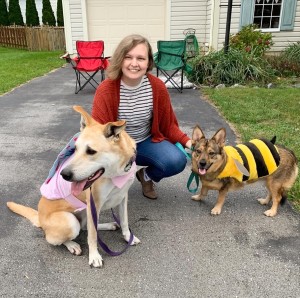
Savannah Admire
Savannah Admire is a writer, poet, and pet mom to three dogs and a cat. She currently lives in Western Maryland. When she’s not writing, you can find her reading, taking photos, or volunteering as a content creator for her local community theatre. Her debut poetry book, Mother Viper, is due out August 12, 2025, and you can follow her on Instagram at @savannahcooperpoetopens in new tab.
Related articles
![Woman walking her dog in a park]()
Dog Walking 101: How Often You Should Walk Your Dog
Your dog may need more exercise than you think, according to three pet experts
![Two hands holding a very young tan and white puppy up in front of a lake landscape]()
How to Socialise a Puppy
Everything you need to know to get your new addition off to a good start
![Puppy hides under the couch in fear]()
How to Keep Your Dog From Freaking Out When You Have Company
Do these things to help your pup (and your guests) feel chill
![Dog walker walking with her pet on leash on the sidewalk]()
10 Tips You’ll Definitely Want to Follow When You Walk Your Dog
From the safest gear to training recommendations

